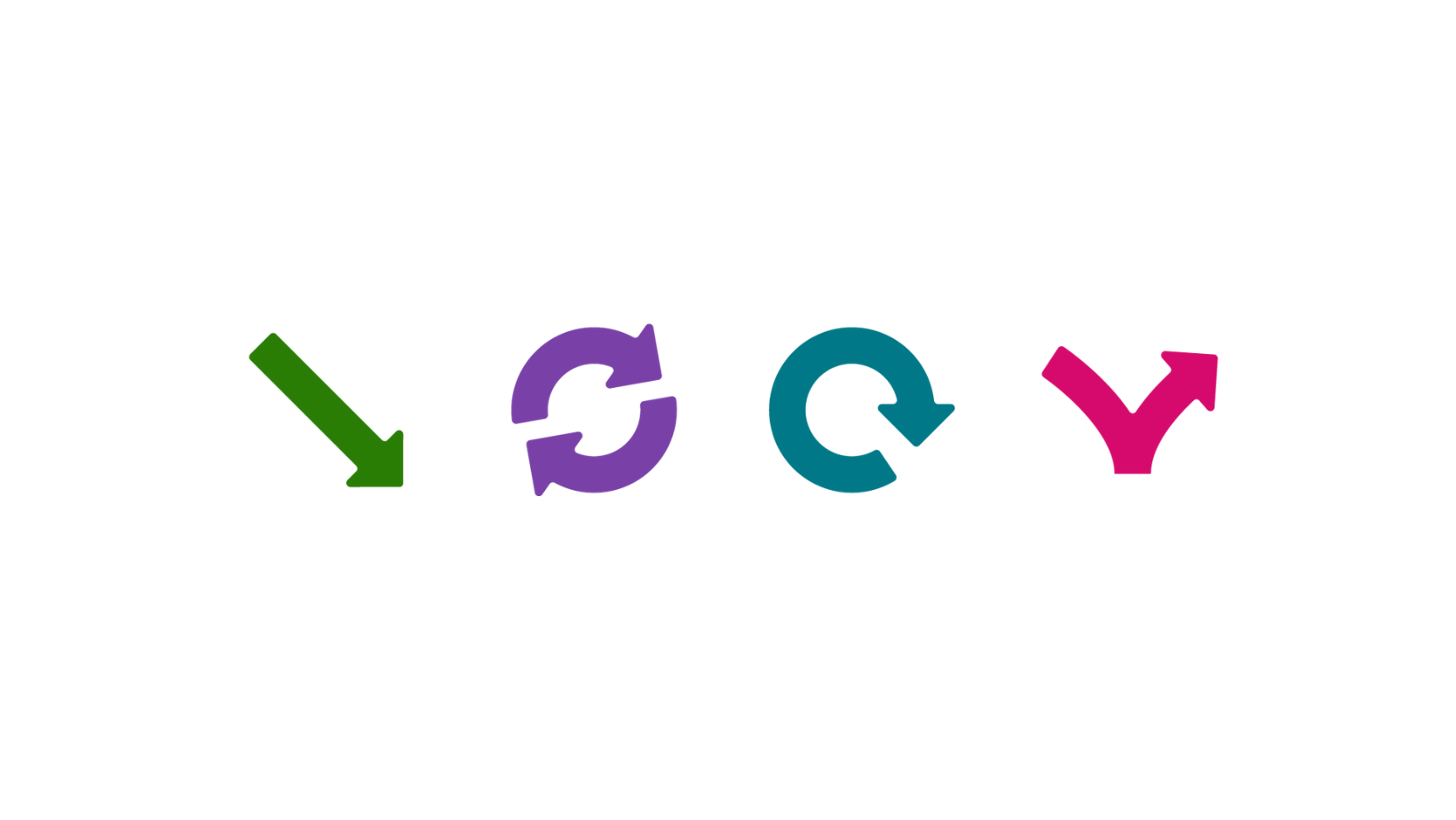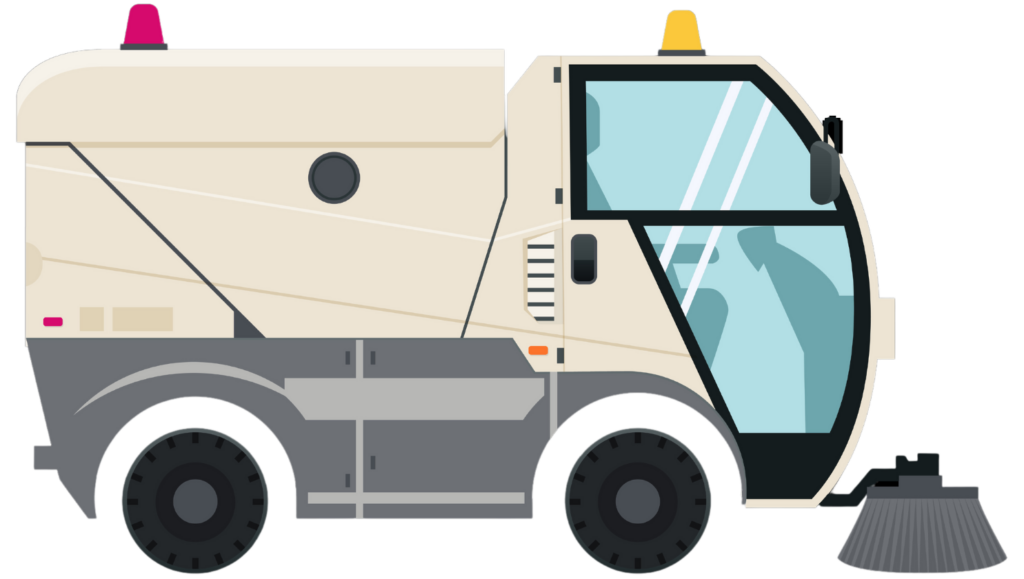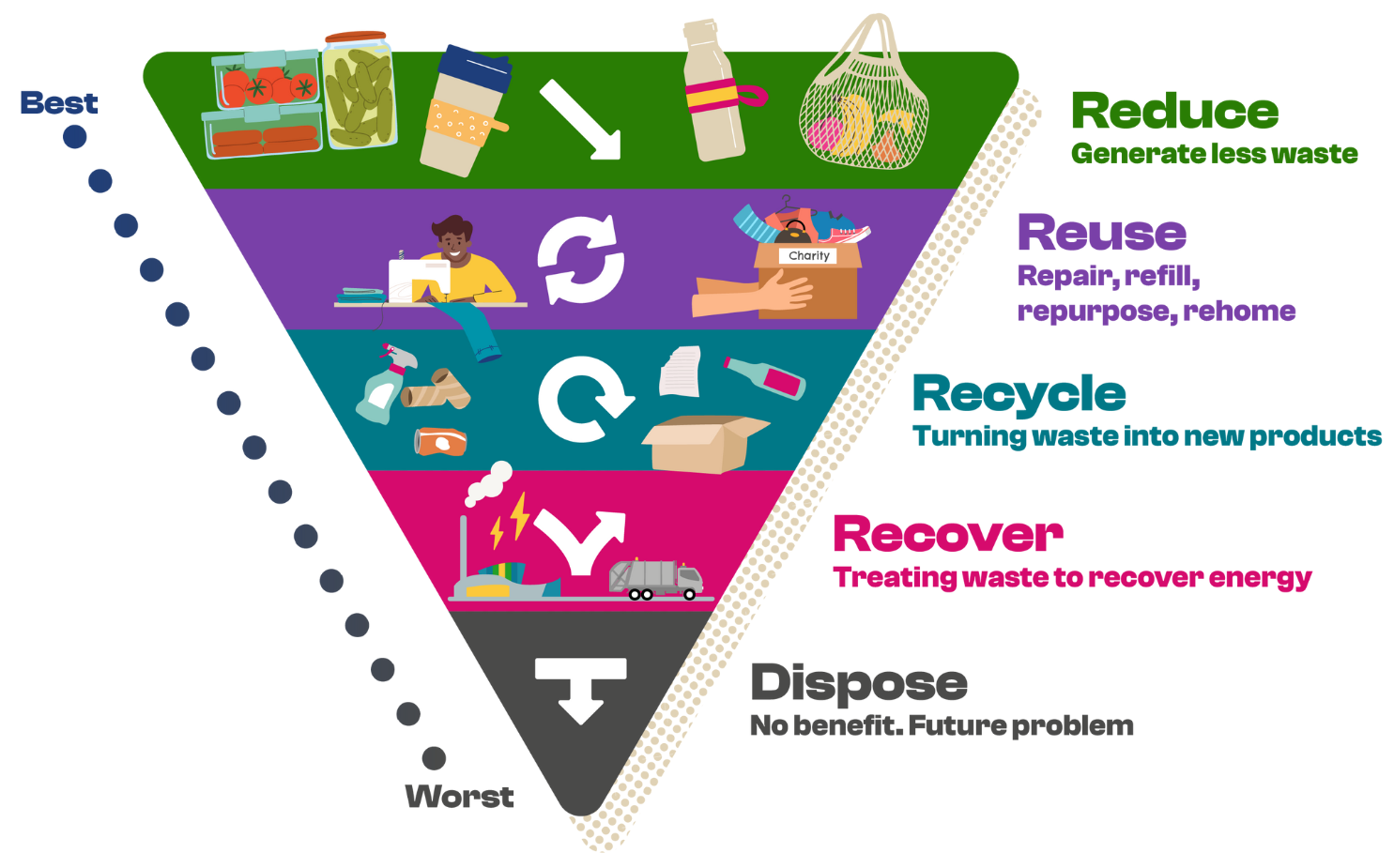
It’s time to Rethink Waste
Thanks to our residents, South Oxfordshire and Vale of White Horse are two of the best recycling areas in England.
This is something we should all be proud of – but there is much more we can do to cut down on the amount of things we throw away, pollute less, reduce costs and tackle the climate emergency.
To help us all do more, we’ve developed a plan for how we will Rethink Waste.
Following the key themes of Reduce, Reuse, Recycle and Recover we’ve set out ways everyone can reduce the amount of waste they produce. We want to encourage and enable people to reuse, repair, refill and rehome items, instead of throwing them away.
Together we can make the most of what we already have
‘The Waste Hierarchy’ below shows the ways of managing our waste – from best to worst – to see a larger version of the hierarchy, please click on the image.
To see a short summary of some of the key actions we plan to take from these themes, watch our short Rethinking Waste video below.
For more information on some of the key actions, keep scrolling, alternatively, you can read our full Rethinking Waste – Waste Resources and Street Cleansing Strategy 2024.
We’ll support you to reduce waste
- Helping you to cut down on your non-recyclable waste – lots of recyclable and reusable items end up in our general waste bins, it’s time for a change!
- Changing our communications so we encourage you to only put your rubbish bin out when it’s full – this will help to reduce emissions from our vehicles from unnecessary collections and help to save money!
- Helping you to reduce the amount of food being wasted – currently, over 70% of food which is thrown away doesn’t need to be. If we cut this out, then everyone will save money!
- Reviewing our waste collection service – with national changes coming soon to cut down on packaging, we’ll continue to review our service to ensure it’s fit for purpose and cost effective.
We’ll support you to reuse items instead of throwing them away
- Supporting communities to run ‘library of things’ – this will allow you to share and borrow items that are used less often, such as crockery for a party or tools for gardening or DIY.
- Supporting existing refill stations or helping to develop new ones – many bottles can be used hundreds of times, so we want to make it easier for you to refill them, rather than seeing them thrown away!
- Encouraging and supporting everyone to adopt donating / re-selling as the go to option for items you no longer use – this will reduce the strain of unsustainable consumption and help us all to save money!
- Supporting and helping to develop community repair schemes – repairing broken items and using them again is much better than throwing them away and wasting money on buying new ones!
We’ll aim to ensure as many items that should be recycled can be
- Providing more information on what can and cannot be recycled – to help everyone to get better at recycling!
- Encouraging more recycling of textiles, batteries and small electricals – these items often wrongly get put in people’s rubbish bins meaning we miss the chance to reuse vital materials and, in the case of batteries and electricals, can also be a big fire risk too.
- Supporting home and community composting – this could help to reduce the amount of collections our vehicles have to make, cut emissions and enhance soil biodiversity too!
- Better promoting what happens to recycling once it’s collected – this will help to highlight the importance of items being put out for collection correctly.
- Engaging with schools on recycling and waste reduction – schools will soon use the same methods that residents use for recycling, ensuring everyone has a better understanding from an early age.
We’ll try to recover as much energy as possible from items that can’t be reused or recycled
- Encouraging people to put food waste in their food waste bin – food is still one of the most common items people wrongly put in their general rubbish bin!
- Working with the county council to analyse what’s ending up in our waste and recycling – this will help us to reduce waste and to understand and support efficient waste recovery.
- Helping people to access the compostable material recovered from our waste processes – events such as our annual compost giveaway are a great way to engage with residents and encourage composting.
Our aim is to minimise the amount of items that end up being thrown away
- Proposing, developing and encouraging positive actions everyone can take to Reduce, Reuse and Recycle.
- Better communicating alternative options for items that typically end up in the bin, so that disposal is only used as a last resort.
Rethinking Waste is not just about how we deal with waste at home, it’s also important our streets and public areas are kept clean and tidy too.

We’ll continue to deliver clean public spaces for everyone to enjoy and make it easier for you to report waste-related issues.
Actions we’ll take to ensure our streets and public areas are kept clean and tidy, include:
A community-driven approach to reduced litter
We’ll aim for more effective placement, replacement, and refurbishment of bins and signage. We’ll work with communities to improve the look and feel of the districts and increase support for volunteer litter picking.
Tackle fly-tipping more effectively
We’ll use surveillance technology to discourage littering and fly-tipping and catch offenders. We’ll improve our reporting processes and we’ll do better to inform people about their responsibilities for waste removal.
A localised approach to street cleansing
We’ll work with parish councils and communities to develop a localised approach to street cleansing and maintaining key locations. We’ll aim to react better to seasonal issues such as leaf fall and flooding; and we’ll work with partners to revise requirements and arrangements for cleansing fast roads, such as the A34.
This is a community effort, which needs everyone, councils, residents, visitors and businesses, to play their part.
Our Rethinking Waste plan will support vital efforts to tackle the climate emergency with more energy-efficient collection vehicles and environmental value from the material we collect. And we promise that your kerbside collection service will continue to be easy and efficient.
To find out more, check out our Rethinking Waste – Waste Resources and Street Cleansing Strategy 2024.
